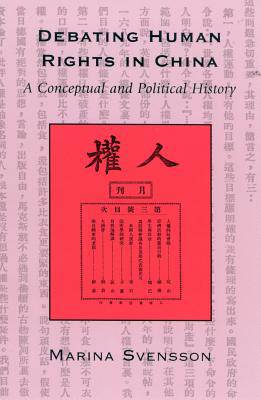
En raison d'une grêve chez bpost, votre commande pourrait être retardée. Vous avez besoin d’un livre rapidement ? Nos magasins vous accueillent à bras ouverts !
- Retrait gratuit dans votre magasin Club
- 7.000.000 titres dans notre catalogue
- Payer en toute sécurité
- Toujours un magasin près de chez vous
En raison de la grêve chez bpost, votre commande pourrait être retardée. Vous avez besoin d’un livre rapidement ? Nos magasins vous accueillent à bras ouverts !
- Retrait gratuit dans votre magasin Club
- 7.000.0000 titres dans notre catalogue
- Payer en toute sécurité
- Toujours un magasin près de chez vous
Debating Human Rights in China
A Conceptual and Political History
Marina Svensson
Livre relié | Anglais
285,45 €
+ 570 points
Format
Description
Tracing the concept of human rights in Chinese political discourse since the late Qing dynasty, this comprehensive history convincingly demonstrates that--contrary to conventional wisdom--there has been a vibrant debate on human rights throughout the twentieth century. Drawing on little-known sources, Marina Svensson argues that the concept of human rights was invoked by the Chinese people well before the adoption of the Universal Declaration of Human Rights in 1948, and that it has continued to have strong appeal after 1949, both in Taiwan and on the mainland. These largely forgotten debates provide important perspectives on and contrasts to the official PRC line. The author gives particular attention to the issues of power and agency in describing the widely divergent views of official spokespersons, establishment intellectuals, and dissidents. Until quite recently the PRC dismissed human rights as a bourgeois slogan. Yet the globalization of human rights and the growing importance of the issue in bilateral and multilateral relations have forced the regime to embrace, or rather appropriate, the language of human rights, an appropriation that continues to be vigorously challenged by dissidents at home and abroad. By exploring the relationship between domestic and international human rights discourses, this study offers new insights not only into the Chinese but also into the Western human rights debate. Students and scholars of China and of human rights will find this work an important tool for understanding one of the great issues of our time.
Spécifications
Parties prenantes
- Auteur(s) :
- Editeur:
Contenu
- Nombre de pages :
- 400
- Langue:
- Anglais
Caractéristiques
- EAN:
- 9780742516960
- Date de parution :
- 14-05-02
- Format:
- Livre relié
- Format numérique:
- Genaaid
- Dimensions :
- 149 mm x 237 mm
- Poids :
- 644 g

Les avis
Nous publions uniquement les avis qui respectent les conditions requises. Consultez nos conditions pour les avis.






